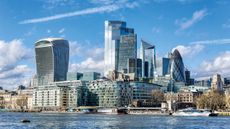The outlook for stocks is improving
This is the best of times for investors, says Max King. Global risks are receding, but few have noticed.


In June 2022 Jamie Dimon, CEO of JPMorgan, advised investors “to brace... for an economic hurricane” caused by the war in Ukraine, rising inflation and higher interest rates.
In August, he warned that “something worse” than a recession could be coming. In October, he claimed that “very, very serious headwinds” were likely to push the US and the world into recession “in six to nine months”.
In early April, he said that the “odds of a recession had risen” as a result of the banking crisis, “which was not over”. Dimon was far from alone.
Subscribe to MoneyWeek
Subscribe to MoneyWeek today and get your first six magazine issues absolutely FREE

Sign up to Money Morning
Don't miss the latest investment and personal finances news, market analysis, plus money-saving tips with our free twice-daily newsletter
Don't miss the latest investment and personal finances news, market analysis, plus money-saving tips with our free twice-daily newsletter
The International Monetary Fund (IMF) was at the forefront of the large majority of economists forecasting recession and the prevailing stockmarket wisdom was of a worsening bear market as a result of rising bond yields and falling corporate earnings.
As late as March, strategists were more bearish than at any point since 2008. Economist and market strategist Ed Yardeni of Yardeni Research called it “a pandemic of pessimism”.
He had never thought the probability of a US recession to be more than 40% and reduced that to 30% in early May. He pointed out that the S&P 500 index was up by 15.6% since its October lows, helped by a turnaround in first-quarter profits.
These were down by an annual 3.3%, but had beaten expectations by 7%. The year-on-year comparison is expected to be up 9% by the end of 2023.
The outlook for stocks
Moreover, the market rally has been led by the growth companies, with the capitalisation of the “MegaCap8” (Amazon, Alphabet, Microsoft, Netflix, Meta, Nvidia, Tesla and Apple) rising by 36% so far this year. They now account for 25% of the index.
These are exactly the companies the bears were convinced were most overvalued. The reason for the resilience of earnings is simple. Every business saw the storm clouds ahead and took action to batten down the hatches, reduce costs and cut borrowings.
As a result, profits held up, the spread between corporate and government bond yields barely widened and share prices recovered. Now, businesses are pleasantly surprised that economies may have slowed down but are not going into recession.
Even the IMF has now raised its world growth forecast to 2.8% in 2023 and 3% in 2024. The US is expected to grow by 1.6%, the EU by 0.8%, Japan by 1.3% and the UK by 0.4%, although as Liam Halligan notes on GB News, 25 of the IMF’s last 28 forecasts for the UK have been too low.
The growth outlook has been bolstered by the fall in energy prices, notably crude oil slipping from a peak of over $120 a barrel in mid-2022 to just $73.
This, together with the 19.7% fall in the Food Price index of the United Nations’ Food and Agriculture Organisation, has lowered inflation. The US rate has dropped from 8.3% last year to below 5%, making it likely that US interest rates have peaked at 5.25%.
Inflation in the EU is still 7.3%, but the European Central Bank expects it to average 5.3% this year and 2.9% next year. Interest rates, now 3.25%, are expected to reach 4% in the second half. Bond yields never reflected rising inflation.
This was widely regarded as an indicator of imminent recession (recessions normally bring yields down). But yields haven’t risen as the economic outlook has improved. Ten-year Treasury yields in the US are 0.3% lower than last autumn’s peak of a little above 4%.
Eurozone yields have been broadly flat at 3.3%, despite higher inflation. This leaves the UK as an outlier with inflation data continually disappointing and interest-rate expectations continuing to rise.
The economy has performed better than expected in the short term, but its long-term structural problems look insoluble. Here the clouds of pessimism have not lifted.
Government bond yields are close to October’s short-lived peak and the FTSE All-Share index has climbed by just 1.4% this year, even though UK companies make most of their sales abroad.
Investors should close their eyes to the troubles of the UK because it is no longer significant for global markets. Last year’s good performance of the UK market, concentrated in the last quarter, may prove to be just an anomaly.
This year, Japan, up 18%, is leading the way, but momentum is building in the US (up 8%) and Europe (up 10%) is doing well too. As Yardeni says, stockmarkets have been climbing the wall of worry.
Worries remain plentiful, but this is the best of times for investors: risks are dropping away and few have noticed.
Max has an Economics degree from the University of Cambridge and is a chartered accountant. He worked at Investec Asset Management for 12 years, managing multi-asset funds investing in internally and externally managed funds, including investment trusts. This included a fund of investment trusts which grew to £120m+.
Max has managed ten investment trusts (winning many awards) and sat on the boards of three trusts; two directorships are still active.
After 39 years in financial services – including 30 as a professional fund manager – Max took semi-retirement in 2017.
Max has been a MoneyWeek columnist since 2016 writing about investment funds in magazine and more generally on markets online, plus occasional opinion pieces. He also writes for the Investment Trust Handbook each year and has contributed to The Daily Telegraph and other publications.
See here for details of current investments held by Max.
-
-
 Investment trust discounts hit 2008 levels. Here’s how to profit
Investment trust discounts hit 2008 levels. Here’s how to profitInvestment trust discounts have risen to levels not seen since 2008, here are three trusts looking to buy to profit.
By Rupert Hargreaves Published
-
 A luxury stock to buy at a high street price
A luxury stock to buy at a high street priceInvestors wrongly consider Watches of Switzerland a high-street outlet.
By Dr Matthew Partridge Published
-
 Investing in wine: how Cru Wine is reaching new audiences
Investing in wine: how Cru Wine is reaching new audiencesTips Gregory Swartberg, founder of fine wine specialist Cru Wine, talks to Chris Carter about how to start a wine collection
By Chris Carter Published
-
 Small companies with big potential
Small companies with big potentialMichael Taylor of Shifting Shares reviews his 2023 picks and highlights more promising minnows.
By Michael Taylor Published
-
 The MoneyWeek portfolio of investment trusts – July 2023 update
The MoneyWeek portfolio of investment trusts – July 2023 updateTips A decade ago we set up the MoneyWeek portfolio of investment trusts. They remain a compelling long-term bet says Rupert Hargreaves
By Rupert Hargreaves Published
-
 Women lead the way with ethical investments
Women lead the way with ethical investmentsDemand for more ethical investments has soared – and women are more likely to opt for them. Annabelle Williams, personal finance specialist at Nutmeg, takes a look at why.
By Annabelle Williams Published
-
 BoE: Mortgage payments to rise by £220 a month for households
BoE: Mortgage payments to rise by £220 a month for householdsMillions of households can expect a mortgage spike of around £200 a month - and some may even reach a extra £1,000 a month, the Bank of England warns
By Marc Shoffman Published
-
 What happened to Thames Water?
What happened to Thames Water?Thames Water, the UK’s biggest water company could go under due to mismanagement and debt. We look into how the company got itself into this position, and what investors should expect.
By Simon Wilson Last updated
-
 Where to invest in the metals that will engineer the energy transition
Where to invest in the metals that will engineer the energy transitionA professional investor tells us where he’d put his money. This week: John Ciampaglia, manager of the Sprott Energy Transition Materials UCITS ETF.
By Nicole García Mérida Published
-
 How investors can profit from high food prices
How investors can profit from high food pricesThe latest furore over grocery prices will die down, says David Stevenson. But the long-term outlook for soft commodities remains bullish. These are the stocks investors can buy to profit from high food prices.
By David J Stevenson Published









